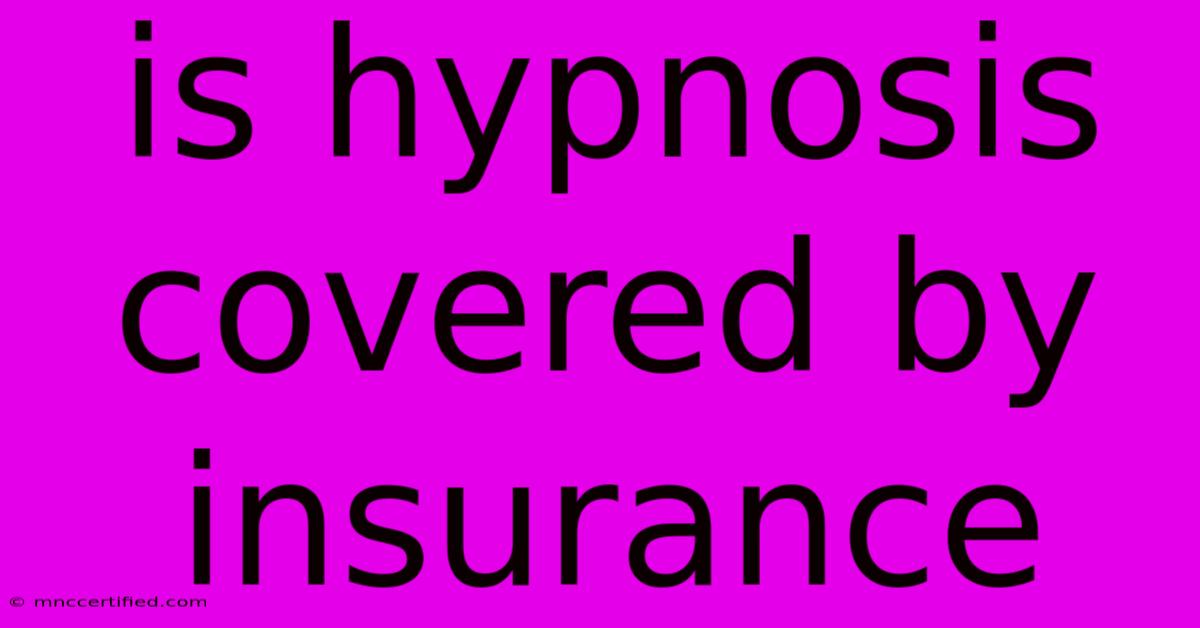Is Hypnosis Covered By Insurance

Table of Contents
Is Hypnosis Covered by Insurance? A Comprehensive Guide
Hypnosis is gaining popularity as a complementary therapy for various mental and physical health concerns. However, a common question arises: Is hypnosis covered by insurance? The answer, unfortunately, isn't a simple yes or no. Coverage depends heavily on several factors, making it crucial to understand the nuances before seeking treatment.
Factors Influencing Insurance Coverage for Hypnosis
Several key factors determine whether your health insurance plan will cover hypnosis:
1. Your Specific Insurance Plan:
This is the most significant factor. Insurance policies vary widely. Some plans may cover hypnosis as part of a broader treatment plan for a specific condition, while others may not offer any coverage at all. Even within the same company, different plans can have different benefits. You'll need to carefully review your policy documents or contact your insurance provider directly to determine your coverage. Look for keywords like "mental health services," "alternative therapies," or "behavioral health" within your policy details.
2. The Diagnosable Condition:
Insurance companies are more likely to cover hypnosis when it's used as a treatment for a diagnosed mental or physical health condition. For instance, if you're seeking hypnosis for anxiety, smoking cessation, or pain management under the guidance of a licensed professional, there's a higher chance of coverage compared to using hypnosis for personal growth or self-improvement. Your therapist will need to provide proper documentation linking the hypnosis to your specific diagnosis.
3. The Provider's Credentials:
Insurance providers often require that the hypnotist be a licensed professional, such as a psychiatrist, psychologist, or licensed clinical social worker. They may not cover sessions with practitioners who lack formal medical or mental health qualifications. Always verify the credentials of your chosen hypnotist and inquire about their insurance provider affiliations before scheduling appointments. This helps avoid costly out-of-pocket expenses.
4. The Type of Hypnosis:
The specific type of hypnosis used might also affect coverage. While some insurers are open to various forms of hypnotherapy, others may only cover specific approaches. It's best to confirm with your provider which types of hypnosis your policy covers.
5. Geographic Location:
Insurance coverage can vary depending on your location. State laws and regulations regarding alternative therapies influence the acceptance of hypnosis within insurance plans.
How to Determine Your Coverage:
Here's a step-by-step guide to determine if your insurance covers hypnosis:
- Review your policy documents: Carefully examine your policy details, looking for keywords related to mental health services, alternative therapies, or behavioral health.
- Contact your insurance provider: Call your insurance company's customer service line. Provide them with the CPT (Current Procedural Terminology) code(s) related to hypnotherapy, if available, and the name and credentials of your chosen hypnotist.
- Ask your hypnotist: Inquire with your chosen hypnotist about their experience with insurance billing and which insurance companies they typically work with. They may be able to provide insights based on their past experience.
- Pre-authorization: In some cases, you might need pre-authorization from your insurance company before starting hypnosis therapy. This involves getting prior approval from your insurer for the treatment.
Alternatives if Hypnosis Isn't Covered:
If your insurance doesn't cover hypnosis, consider these options:
- Exploring payment plans: Negotiate a payment plan with your hypnotist.
- Seeking out lower-cost providers: Research different practitioners to find those offering more affordable services.
- Utilizing a Health Savings Account (HSA) or Flexible Spending Account (FSA): These accounts can often cover out-of-pocket medical expenses, including alternative therapies.
Conclusion:
While insurance coverage for hypnosis varies widely, understanding the factors influencing coverage allows you to navigate the process effectively. By diligently reviewing your policy, contacting your insurance provider, and verifying your hypnotist's credentials, you can increase your chances of getting the coverage you need. Remember, proactive communication is key to successfully accessing this potentially beneficial therapeutic approach.

Thank you for visiting our website wich cover about Is Hypnosis Covered By Insurance. We hope the information provided has been useful to you. Feel free to contact us if you have any questions or need further assistance. See you next time and dont miss to bookmark.
Featured Posts
-
This Weekends Racing Highlights
Nov 21, 2024
-
Gere Scolds Guthrie On Today Show
Nov 21, 2024
-
Liam Paynes Funeral One Direction Support
Nov 21, 2024
-
Amersham High Street Closure Funeral
Nov 21, 2024
-
Does Insurance Cover Ear Pinning
Nov 21, 2024